Edie Melson's Blog, page 97
February 27, 2023
Dipping the Quill Deeper: Keeping Godly Secrets
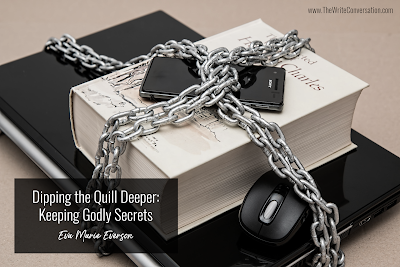
by Eva Marie Everson
Can you keep a secret? Can you?
It’s difficult at times, I know. Especially the good news kind. Like, say, the kind that says, “Our family is enlarging come this fall.” Or, “Our granddaughter made it into law school.” Or, “The cancer is gone. Gone. The doctors don’t know what to think.”
Those secrets are much harder to keep, I dare say, than the juiciest bits of gossip.
Jesus often showed His penchant for keeping secrets.
When Peter declared that Jesus was the Christ, the Son of the Living God, Jesus’ reply was that they should not tell anyone (Matthew 16). Often, after healing those who were sick or even dead, He ordered witnesses to stay silent.
After He was transfigured in the presence of Peter, James, and John—and in the company of Elijah and Moses—He told the three not to tell what they’d seen until He’d been raised from the dead.
Can you imagine? They must have thought, “What does He mean raised from the dead?” But also, let’s say Andrew came to his brother Peter afterward and said, “Hey, tell what went on up on that mountain,” surely Peter would have been itching to tell him. But he did not.
Jesus said to keep quiet.
Have you ever had times like this in your experience as a writer? Times when God shows you even so much as a glimmer of what is to come in your writing ministry or in your career? Times when, even given such great news, you knew you were to just zip it?
It’s hard, especially if you know something big is on the horizon because your agent and you (or just you) are in negotiations for something super exciting, something you’ve worked hard toward and prayed diligently for.
Staying silent under God’s command can be humbling, however. Think about it—you see a fellow writer’s post on social media in which they share some big new they have, and you so want to comment with something like, “Wait till you hear my news!”
But God knows that this moment isn’t about your moment. This is their moment. And yours will come. And you will have grown humble (and perhaps more so) in the process because you will see that this isn’t about your work; it’s about His work. Kingdom work.
So let’s look back at what Peter or James or John may have said once Jesus was out of earshot. “Guys! You should have seen it. It was . . . it was like . . . and then Peter said something stupid about building tents . . . and there was Moses—no, seriously, Moses—and Elijah—no, we’re not kidding.”
Oomph. Eventually, that moment would have lost its luster because it went against what God had commanded.
Instead, many years after the resurrection and ascension of Christ, Peter wrote: For we did not follow cleverly devised stories when we told you about the coming of our Lord Jesus Christ in power, but we were eyewitnesses of his majesty. He received honor and glory from God the Father when the voice came to him from the Majestic Glory, saying, “This is my Son, whom I love; with him I am well pleased.” We ourselves heard this voice that came from heaven when we were with him on the sacred mountain (2 Peter 1: 16-18).
John wrote: That which was from the beginning, which we have heard, which we have seen with our eyes, which we have looked at and our hands have touched—this we proclaim concerning the Word of life. The life appeared; we have seen it and testify to it, and we proclaim to you the eternal life, which was with the Father and has appeared to us. We proclaim to you what we have seen and heard, so that you also may have fellowship with us. And our fellowship is with the Father and with his Son, Jesus Christ. We write this to make our[a] joy complete (1 John 1: 1-4).*
Could finer words have been written about this magnificent moment? Would they have been as precious had the timing not been right? Had they not kept the secret and allowed His story in their story to be about the Kingdom’s story?
What about you? Can you keep a secret?
*(James was the first of the Twelve to be martyred and, therefore, to our knowledge, did not write of his witnessing of the transfiguration. See Acts 12: 1,2.)
TWEETABLEDipping the Quill Deeper: Keeping Godly Secrets, thoughts from author @EvaMarieEverson on @EdieMelson (Click to Tweet)
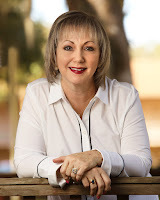 Eva Marie Everson is the CEO of Word Weavers International, the director of Florida Christian Writers Conference, and the contest director for Blue Ridge Mountains Christian Writers Conference. She is the multiple award-winning author of more than 40 books and countless articles and blogposts. She is also an award-winning speaker and a Bible teacher and the most recent recipient of the AWSA Lifetime Achievement Award (2022).
Eva Marie Everson is the CEO of Word Weavers International, the director of Florida Christian Writers Conference, and the contest director for Blue Ridge Mountains Christian Writers Conference. She is the multiple award-winning author of more than 40 books and countless articles and blogposts. She is also an award-winning speaker and a Bible teacher and the most recent recipient of the AWSA Lifetime Achievement Award (2022). Eva Marie is often seen at writers conferences across the States. She served as a mentor for the Jerry B. Jenkins Christian Writers Guild and taught as a guest professor at Taylor University in 2011. She and her husband make their home in Central Florida where they enjoy their grandchildren. They are owned by one persnickety cat named Vanessa.
Eva Marie's latest book, THE THIRD PATH, takes a look at 26 of the questions God asked in the Bible, then makes them personal to the reader. The premise of the book is currently her most asked for continuing workshop at writers conferences.
February 26, 2023
How Authors Practice Patience While Waiting to Hear News on a Submitted Manuscript
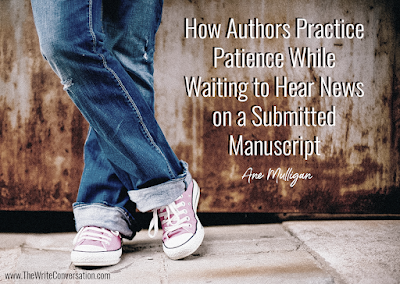
by Ane Mulligan @AneMulligan
Congratulations! You finished your manuscript. That's so exciting! At the conference you went to, an agent (or editor) you pitched asked to see the full manuscript. When you got home, you polished it and sent it off.
Now what? How do you do pass the time, while you're waiting to hear back from the publisher? Sitting around twiddling your thumbs isn't the best use of your time, and you don’t want to send another email asking where the contract is. In fact, you don’t send anything for 3 months, if you haven’t heard back.
I know it’s hard to wait. That’s your baby you sent off, so here are my tips to keep you busy while waiting—some really good and some…well, see for yourself.
11 Tips for After Manuscript Submission
1. Clean out your sock drawer: If yours is anything like mine, it could use a good cleaning and culling. And while you're at it, you can dismantle your clothes dryer to find the ones it ate. You might even find the missing mate to your Halloween jack-o-lantern socks.
2. Sort out your bathroom drawers: We all collect makeup and manicure items we don't seem to use. I'm donating my nail polish to the little girls next door. They like to paint their daddy's toenails, and I get so tickled at his embarrassment during the summer.
3. Catch up on your laundry: If nothing else, reduce the 6-foot-high piles in your bedroom and the kids' rooms to 2-foot piles.
4. Paint the deck: You complained to your husband about it last Spring when you wanted to write outside. Now's a good time. Grab that roller and have at it.
5. Clean the chimney: After all, if Dick Van Dyke could do it, so can you. Just be sure to use proper harnessing in case you get stuck, so someone can pull you back out.
6. Spend hours on social media: Make up for all the time you were writing and stayed off Facebook. Post how anxious you are that A to Z Publishing hasn't sent your contract yet.
Okay, those are all fairly silly and not all that productive for a writer. Besides, the kids can do most of those—except number 5. Save that one for your Cousin Eddie.
My Best Advice is:
1. Start your next book: While my agent shopped my first publishable manuscript, I started on the sequel. My journey was long, and God clearly showed me He was in charge of the time and place He had for me. So I kept writing. By the time that first book, Chapel Springs Revival,was published, I had book 2 and 3 written. I've only ever written to one tight deadline.
2. Write an article for a magazine: Magazines are always looking for articles. Check their guidelines to see what they are looking for. Don't send a Southern recipe to a European travel magazine, or a hack for fixing a flat tire to a fashion rag.
3. Take a day trip for inspiration: So many ideas come from driving around. I used the name of a fish bait store I saw in the back woods of upper Lake Lanier. It sparked the inspiration for an entire series.
4. Try your hand a photography: No fancy camera needed. Use your phone. You may find you have a great eye for composition, and who knows? You might just snap a suspicious looking person who sparks the "what if" for your next manuscript.
5. Try new recipes: If you're like me, I don't cook great meals when I'm deep into writing a book. It's catch-as-catch-can for sandwiches and soup. So this is a good time to try out a new crockpot meal. You might be able to use it when you go back to writing.
6. Brainstorm: Get together for lunch with some writer pals and brainstorm ideas. You'll all come away with fiction fodder. And while you're at it, eavesdrop on conversations around you. I've picked up several ideas to incorporate into stories, or characteristics for my next protagonist.
The worst thing you can do is fret about when you will hear back.
TWEETABLEHow Authors Practice Patience While Waiting to Hear News on a Submitted Manuscriptfrom author @AneMulligan on @EdieMelson (Click to Tweet)
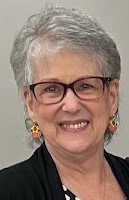 Ane Mulligan lives life from a director’s chair, both in theatre and at her desk creating novels. Entranced with story by age three, at five, she saw PETER PAN onstage and was struck with a fever from which she never recovered—stage fever. One day, her passions collided, and an award-winning, bestselling novelist immerged. She believes chocolate and coffee are two of the four major food groups and lives in Sugar Hill, GA, with her artist husband and a rascally Rottweiler. Find Ane on her website, Amazon Author page, Facebook, Instagram,Pinterest, The Write Conversation, and Blue Ridge Conference Blog.
Ane Mulligan lives life from a director’s chair, both in theatre and at her desk creating novels. Entranced with story by age three, at five, she saw PETER PAN onstage and was struck with a fever from which she never recovered—stage fever. One day, her passions collided, and an award-winning, bestselling novelist immerged. She believes chocolate and coffee are two of the four major food groups and lives in Sugar Hill, GA, with her artist husband and a rascally Rottweiler. Find Ane on her website, Amazon Author page, Facebook, Instagram,Pinterest, The Write Conversation, and Blue Ridge Conference Blog.
February 25, 2023
26 Attributes Writers Need to Embrace to Remain Strong and Impact the World Today
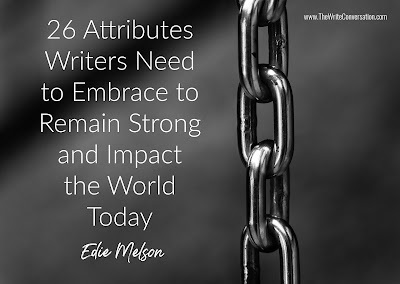
by Edie Melson @EdieMelson
I believe now is the best time of all to be a writer. With the advent of the Internet, there are more opportunities to share our words than ever before. However, along with the good also comes the challenging.
Writers today must be equipped and ready to face many obstacles that our predecessors never imagined—much less faced. We each need a well-equipped personal arsenal to help us stay the course not lose heart amid frequent chaos.
26 Attributes that Make a Writer Stronger
A – Adaptable. The world is changing on a dime. Not only must we adapt and anticipate it, we have to be far enough ahead to actually write about it.
B – Brave. Life is scary—and getting scarier every day. As writers, we must be willing to move forward and share the words God has laid on our hearts even though we run the risk of being criticized or even cancelled because of what we write.
C – Creative. All the writers I know personally struggled with creativity during the intense time of COVID lockdown. There may have been a few who didn’t, but I don’t know of a single one. Some are still fighting to fill that creative well. We must each learn what we need to do to bolster our creativity and then we must be diligent to do it.
D – Disciplined. Writing is a creative endeavor, but it’s also—for many of us—our source of income. That means we must be disciplined to write when we feel like it and when we don’t.
E – Equipped. As a believer who writes, I must be equipped by God to share the words in my heart. This means I need to constantly stay close to Him through study, prayer and a growing relationship.
F – Faithful. Each writer’s calling is unique. And each writer is valuable. We must remain faithful to follow the path set before us. Now isn’t the time to doubt or waver.
G – Grace-filled. By this I mean we should give everyone we meet the benefit of the doubt. If I’m criticized, I need to look for a kernel of truth, even if it hurts. And I need to remember that I don’t know what’s going on in someone else’s life. They may be in the midst of a storm and unable to treat me the way I want to be treated.
H – Hopeful. For me as a believer, my hope is steadfast in God. I have learned by study and experience that His timing is perfect. So no matter how long it takes, I remain hopeful as I wait on Him.
I – Inclusive. Today there are too many things that divide us. I want my words to include others. I want those who read what I write to feel seen and heard.
J – Joyful. I never want to come across as falsely optimistic. Instead I want everyone I meet to see the joy I feel. It’s a blessing to live in this time—even with social media! LOL. We can reach the world with our words without ever leaving our homes. This is a great time that God has chosen for me and I never want to forget that.
K – Kind. I want my words to bring hope and healing. I never want my words to injure or destroy someone who’s vulnerable. However, I never want to water-down the truth. Misleading someone isn’t a kind thing to do either.
L – Loyal. I hope that I’m seen as loyal—to my God, my calling, my family, my friends and my audience.
M – Multifaceted. Writers today must have numerous skills. We need to how to reach an online audience, as well as those who read printed materials. No longer can we rely on a single thing to reach our readers, instead we have to learn how to do a lot of things—from social media to videos. I hope I never shrink from learning new things that help me become a more effective writer.
N – Near. I hope my writing is near to the hearts of my readers. I pray that I stay near to my God. And I hope that my words convey the idea that there is always someone nearby that cares.
O – Observant. I want to be an observant writer. I want to see things, situations and people that others may miss or find unimportant. I pray that my words may someone stop and really see what’s around, from the blessings in every life, to the fact that God is always present and ready to walk with us through the difficult times.
P – Peaceful. I don’t really have any wish to be an arbitrator, instead what I want to be is someone who helps others see the peace of God in every situation. Jesus walked into chaos and brought peace. When we allow the Holy Spirit to work through us, we can also be instruments of God’s peace.
Q – Quiet. I want to be slow to speak and quick to listen. I want to pause and consider the things around me—and the things God is showing me. I want to carry deep inside the confidence to not always have to speak up and be right.
R – Revolutionary. I don’t want to accept the status quo. I want to always be striving for something better. I want to my words to bring about positive changes.
S – Secure. I want to be a writer who is secure in the place I am right now. I don’t want to be comfortable and unwilling to grow, but I also don’t want to be dissatisfied.
T – Teachable. My I never think I’ve arrived. I know there will always be things to learn and people to learn from. I don’t ever want to feel superior and like I can’t learn from someone.
U – Unique. I want to embrace the things that make me unusual as a writer. Each of us could write about the same thing and end up with something different. It’s that uniqueness that we must value. None of us is better or worse, but we all need to embrace being unique.
V – Vulnerable. Even though it scares me, I want to vulnerable. I want to be willing to reach out and speak into hard situations, describe challenging times, and embrace difficult people. I want to be unashamedly me—no masks and no lies.
W – Well-informed. It’s far too easy to only read what we agree with. But I’ll never grow if I don’t listen to the things in life that make me uncomfortable. That doesn’t mean I’ll always change my mind, but I need to know what’s out there and be willing to listen with an open mind and heart.
X – Xerophilous. I want to practice flourishing in a dry season. I have learned it’s necessary to write when I’m full and when I’m empty.
Y – Yes. I want to be a writer that says yes. Yes, I’ll try that. Yes, I’ll learn that. Yes, I’ll do that for you.
Z – Zealous. I want to be zealous about improving as a writer. I want to be zealous about helping others succeed as writers. I want to be zealous about serving God. I don’t ever want to be complacent and unwilling to be excited about about is coming next.
This is my list—the things I try to use to become the writer God has for me to be. I’d love to know what words you’d add to this list!
Don’t forget to join the conversation!Blessings, Edie
TWEETABLE26 Attributes Writers Need to Embrace to Remain Strong and Impact the World Today from author @EdieMelson (Click to Tweet)
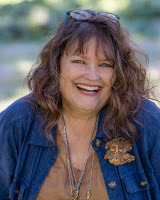 Edie Melson is a woman of faith with ink-stained fingers observing life through her camera lens. She’s a writer who feels lost without that device & an unexpected speaker who loves to encourage an audience. She also embraces the ultimate contradiction of being an organized creative. She knows the necessity of Soul Care and leads retreats, conferences & workshops around the world on staying connected to God. Her numerous books, including the award-winning Soul Careseries & reflect her passion to help others develop the strength of their God-given gifts. Her blog, The Write Conversation is recognized as one of the top 101 industry resources.
Edie Melson is a woman of faith with ink-stained fingers observing life through her camera lens. She’s a writer who feels lost without that device & an unexpected speaker who loves to encourage an audience. She also embraces the ultimate contradiction of being an organized creative. She knows the necessity of Soul Care and leads retreats, conferences & workshops around the world on staying connected to God. Her numerous books, including the award-winning Soul Careseries & reflect her passion to help others develop the strength of their God-given gifts. Her blog, The Write Conversation is recognized as one of the top 101 industry resources. She and husband Kirk have been married 40+ years and raised three sons. They live in the foothills of the Blue Ridge Mountains and can often be found hiking—with Edie clinging to the edge of a precipice for the perfect camera angle and Kirk patiently carrying her camera bag and tripod. Connect with her on her website, www.EdieMelson.com and through social media.
February 24, 2023
Two Key Differences Between Writing with a Worldview and Writing with a Bias
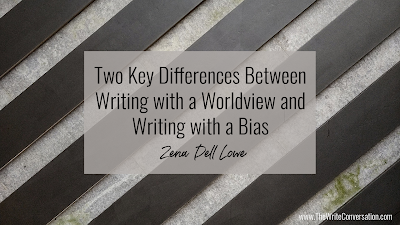
by Zena Dell Lowe @ZenaDellLowe
I’m continually surprised by the number of people who think they’re expressing a worldview when in fact they’re writing with a bias. When I point this out, I’m inevitably asked, “What’s the difference between the two?”
Definitions
A WORLDVIEW is a particular philosophy of life or conception of the world. Every writer, every artist has a worldview, and the personal beliefs you hold to be true about the nature of the universe and reality will inevitably permeate your story. In fact, writing with a worldview is not something that can be avoided--nor should it be. Without a worldview, story has no meaning. The question is, how can we have a worldview and not be biased?
BIAS means to be prejudice in favor of or against one thing, person, or group, usually in a way considered to be unfair.
In other words, the work is biased if you ignore or leave out certain types of information that might challenge your worldview. If you are honest about the complexity of a particular issue, or if you don’t suppress or twist the evidence to conform to your point of view, then there’s a good chance you’re simply reflecting a worldview. As Flannery O'Connor says, “The Christian writer does not decide what is good for the world and then proceed to deliver it. Like a very doubtful Jacob, she enters into the struggle and wonders if she will come out at all.”
Application
This leads us to the second key difference between worldview and bias: Worldview explores a theme, whereas bias presents an agenda. By theme, I’m referring to the main idea or underlying meaning of a literary work. It’s the important idea or specific argument that runs through a piece of literature. Theme is of the utmost importance when it comes to stories. The theme is the overarching point that the author is trying to make without explicitly saying it.
But how does a theme differ from agenda? For starters, an agenda is a list, a plan, or an outline of things to be done; matters to be acted or voted upon; a secret aim or reason for doing something. The key concept here is the secret aim to be accomplished because of a previous commitment to some ideal or belief.
Christians often present a false view of reality. However, people outside of the faith community, such as those with far-left leanings, are also guilty of this. Whereas faith-based writers avoid including things that they consider to be “bad,” liberal artists often deliberately avoid including things that might undermine their liberal philosophies or atheistic underpinnings. In the film Castaway, for example, Tom Hanks’ character was stranded on an island for years and yet he never cried out to God. This was an exclusion born strictly from the screenwriter’s atheistic views. But it’s not realistic since anybody stranded on an island, atheist or not, would at some point cry out to God. It would be unhuman not to.
A theme, then, is a specific idea that's being explored openly and honestly -- not with a pre-determined outcome in mind. One is a discussion. The other is a lecture. People talking AT you versus people talking WITH you. To avoid writing an agenda, resist the temptation to decide in advance what the outcome should be. Give it a fair shake. Be honest. As JK Rowlings wrote, “Sometimes I know what I believe because of what I write.” That's someone who didn't enter a story with a bias and try to force the narrative to fit a preconceived idea. She discovered her theme(s) as she wrote the story. And that's the key: we need to discover it.
If you already know the point you’re trying to make before you even start writing, if you ignore any counterarguments or twist any contradictory evidence because you already know exactly what you want to say, there’s a good chance you’re writing with bias and agenda.
Nobody, especially your audience, enjoys that.
TWEETABLETwo Key Differences Between Writing with a Worldview and Writing with a Bias from @ZenaDellLowe on @EdieMelson (Click to Tweet)
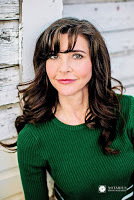 Zena has worked professionally in the entertainment industry for over 20 years as a writer, producer, director, actress, and story consultant. Zena also teaches advanced classes on writing all over the country. As a writer, Zena has won numerous awards for her work. She also has several feature film projects in development through her independent production company, Mission Ranch Films. In addition to her work as a filmmaker, Zena launched The Storyteller’s Mission with Zena Dell Lowe, a podcast designed to serve the whole artist, not just focus on craft. In 2021, Zena launched The Storyteller’s Mission Online Platform, where she offers advanced classes and other key services to writers. Zena loves story and loves to support storytellers. Her passion is to equip artists of all levels to achieve excellence at their craft, so that they will truly have everything they need to change the world for the better through story.
Zena has worked professionally in the entertainment industry for over 20 years as a writer, producer, director, actress, and story consultant. Zena also teaches advanced classes on writing all over the country. As a writer, Zena has won numerous awards for her work. She also has several feature film projects in development through her independent production company, Mission Ranch Films. In addition to her work as a filmmaker, Zena launched The Storyteller’s Mission with Zena Dell Lowe, a podcast designed to serve the whole artist, not just focus on craft. In 2021, Zena launched The Storyteller’s Mission Online Platform, where she offers advanced classes and other key services to writers. Zena loves story and loves to support storytellers. Her passion is to equip artists of all levels to achieve excellence at their craft, so that they will truly have everything they need to change the world for the better through story.To find out more about Zena or her current courses and projects, check out her websites at WWW.MISSIONRANCHFILMS.COM and WWW.THESTORYTELLERSMISSION.COM
February 23, 2023
5 Questions Every Writer Should Ask Themselves BEFORE Sharing a Personal Story
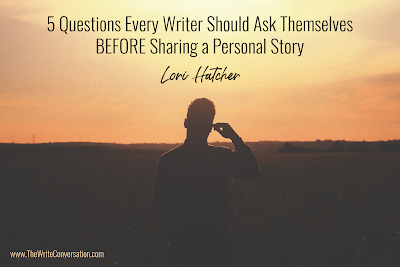
by Lori Hatcher @LoriHatcher2
When I teach non-fiction writing and speaking at writers conferences, I emphasize the power of story. Stories can make an abstract concept understandable. They help us connect with our audience, establish our credibility, and strengthen our message. Jesus, the master teacher, used stories to invoke sympathy, empathy, and understanding.
But what about personal stories? The experiences—good, bad, and ugly—that helped make us who we are? Or someone else’s story that provides the perfect illustration for the point we want to make? Can we tell these stories? Should we tell these stories?
Before you take pen (or computer) in hand and bare all, please consider these five questions:
Five Questions to Ask Before You Share that Personal Story
1. Do I have permission to share?
Traditional publishers require authors to get permission from everyone they’ve written about unless they’ve altered the names and details enough to completely obscure the person’s identity. My rule of thumb is not to write anything about anyone that I wouldn’t feel comfortable reading aloud to them.
2. Will I hurt anyone?
Perhaps more important than the question Can I share this story? is the question, Should I share this story? Some stories, especially those that happened to you, fall within your legal right to tell them. If you do, however, you may harm someone else. If the answer to this question is yes, ask God to show you an alternate way to make your point.
3. Is now the right time to tell?
Many write out of deep personal trauma or crisis. Capturing the events, thoughts, and spiritual lessons learned in times of trial can be cathartic. The process of writing can bring about healing. But don’t rush the process. Just because you’ve written about your experience doesn’t mean you’re ready to share your writing with others. Be sure you’re free of anger, bitterness, and vengeance. Give the Lord time to do His work in your heart and life. Then He can use your writing to bring health and healing to others.
4. Is this the right audience with whom to share?
Effective writers know our audience and tailor our message to their needs. When we’re reader-focused, we choose the stories that will benefit them, not those that will benefit us. You may have a sensational story, but if you have to stretch to connect it to the truth your readers need to hear, perhaps you should choose another.
5. Has God released me?
You may have a story that passed all four of the above questions. You’ve gotten permission from the others involved, and you’re confident you won’t hurt anyone by telling it. God has freed you of bitterness or anger, and the story perfectly fits the needs of your audience. Still, as you pray over your writing (you do pray over your writing, don’t you?) you just don’t have a peace about sharing it. Every time you type the words, you feel a check in your spirit. Don’t ignore this.
God’s Spirit within us knows not only how our stories affect us, but how they’ll affect everyone who reads them. Once we send our words out into the world, we can’t retrieve them. Therefore, we must trust the Spirit to tell us when the time is right to share them. And if the time is right to share them. Some stories may be intended for you alone—and that’s okay.
Stories have an amazing power to connect us to our audience, communicate spiritual truth, and build relationships. They also have the power to cause harm, either intentionally or unintentionally. We are wise to choose and share our stories carefully.
Now it’s your turn. How do you decide which stories to share in your writing? Leave a comment below and join the conversation.
TWEETABLE5 Questions Every Writer Should Ask Themselves BEFORE Sharing a Personal Story from author @LoriHatcher2 on @EdieMelson (Click to Tweet)
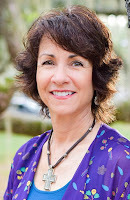 Lori Hatcher is an author, blogger, writing instructor, women’s ministry speaker, and career dental hygienist. She writes for Our Daily Bread, Guideposts, Revive Our Hearts, and Crosswalk.com. Check out her latest devotional, Refresh Your Hope, 60 Devotions for Trusting God with All Your Heart from Our Daily Bread Publishing. Connect with her at www.LoriHatcher.com or on Facebook, Twitter (@lorihatcher2) or Pinterest (Hungry for God)
Lori Hatcher is an author, blogger, writing instructor, women’s ministry speaker, and career dental hygienist. She writes for Our Daily Bread, Guideposts, Revive Our Hearts, and Crosswalk.com. Check out her latest devotional, Refresh Your Hope, 60 Devotions for Trusting God with All Your Heart from Our Daily Bread Publishing. Connect with her at www.LoriHatcher.com or on Facebook, Twitter (@lorihatcher2) or Pinterest (Hungry for God)February 22, 2023
Writer Birthdays—Millstone or Milestone--You Get to Choose
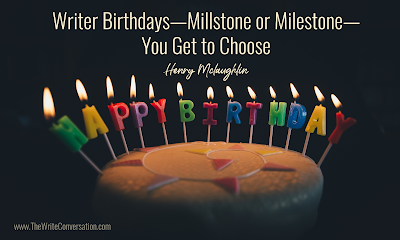
by Henry Mclaughlin @RiverBendSagas
Birthdays can be millstones or milestones. It depends on our perspective and on where and how we see ourselves in this life.
My seventy-fifth birthday passed recently. OK, it’s more like it flew by—a blur of the calendar pages spinning.
More and more, birthdays are a time of reflection, of assessing. Where am I? How does that compare to where I dreamed I’d be at this age when I was in my twenties and thirties? Back then, I thought I’d be long gone from this Earth. At least that’s what the devil tried to tell me.
But God had different ideas. Several major health crises later, I’m still here, still active. Maybe not as strong in the physical sense as I’d like to be. But God’s brought me to spiritual, personal, and relational maturity I never imagined possible.
Spiritually, I’m closer to Him than I ever expected to be. I’ve grown in my heart understanding of how much He loves me. I’ve moved from seeing myself as unworthy to a place of receiving and rejoicing in His love. He’s birthed a servant’s heart in me. I no longer look to be noticed. I look to serve. This is a significant ego shift for me, a complete change in my approach. I no longer look to lead or be in control. I look to obey Him and the spiritual leadership He’s placed me under.
Now, I’m coming out of lengthy writing dry spell—a Sahara of withered ideas at best, or complete drought during its worst moments. I didn’t know if I would ever write again. Writing was a struggle for almost two years while He worked with me on other, more critical areas of my life. Now the writing juices are stirring again. Even at seventy-five, He has plans for me, for my writing, for my contributing. And I’m looking forward to the next phase of the journey.
Birthdays can seem like millstones tied around our necks, dragging us down, telling us the end is near, time to pack it up.
Or birthdays can be milestones marking our journey of life. Yes, there may be many milestones behind us, and we don’t know for sure how many are ahead of us. Milestones are landmarks and guideposts. They call us to keep moving forward in His plan and His will, to be all He is calling us and wanting us to be.
Millstone or milestone? There’s a choice here.
To paraphrase Joshua 24:15, I choose milestone. I decide to see birthdays as markers of a life well-lived for God and my family.
Which do you choose? Millstone or milestone?
TWEETABLEWriter Birthdays—Millstone or Milestone--You Get to Choose, from author Henry McLaughlin (@RiverBendSagas) on @EdieMelson (Click to Tweet)
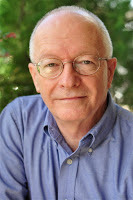 Henry’s debut novel, Journey to Riverbend, won the 2009 Operation First Novel contest.
Henry’s debut novel, Journey to Riverbend, won the 2009 Operation First Novel contest.Henry edits novels, leads critique groups, and teaches at conferences and workshops. He enjoys mentoring and coaching individual writers.
Connect with Henry on his BLOG, TWITTER and FACEBOOK.
February 21, 2023
15 Ways for an Author to Market A Book to Readers Before Writing It!
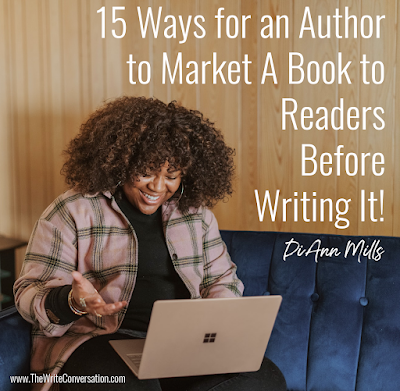
by DiAnn Mills @DiAnnMills
I bet you said, “Impossible” the moment you read the title of this post. No way can I market my book before I write it. Are you sure?
Except it does sound like a good idea. Imagine the work time I’d save when the book releases. Do I have your attention?
15 Ways to Market Your Book Before Writing the First Chapter
1. Update your bio and headshot.
2. Study your story idea for marketing and promotion ideas.
Who is the target audience?How will it appeal to them?What reader questions will it answer or fill a need?3. List the blog topics that could emerge from your book.
4. How could you create a contest or giveaway from your book’s topic?
5. Create social media posts for Facebook, Twitter, Instagram, and other platforms that engage your audience.
6. Search for hashtags that fit your book, genre, topics, and audience.
7. Develop a secret Pinterest board all about your book then publish a month before your book is released.
8. Select meaningful quotes for Goodreads and use those quotes to design memes for social media and the secret Pinterest board.
9. Use a tool like BookBrush to design promotion videos.
10. Write and learn at least one speaking topic from your book.
11. Establish reader questions for individuals or groups.
12. Unfold a packet of book club tips, tricks, and tasty treat ideas to enhance the reader experience.
13. Reach out to blog hostesses who are highly respected and have good traffic to book a guest blog.
14. Schedule the perfect time with a blog tour (or two).
15. Write all needed blog posts about your book.
These are only 15 ideas to consider before writing your next bestseller. What pre-writing marketing and promotion ideas can you share with us?
TWEETABLE
 DiAnn Mills is a bestselling author who believes her readers should expect an adventure. She creates action-packed, suspense-filled novels to thrill readers. Her titles have appeared on the CBA and ECPA bestseller lists; won two Christy Awards; and been finalists for the RITA, Daphne Du Maurier, Inspirational Readers’ Choice, and Carol award contests.
DiAnn Mills is a bestselling author who believes her readers should expect an adventure. She creates action-packed, suspense-filled novels to thrill readers. Her titles have appeared on the CBA and ECPA bestseller lists; won two Christy Awards; and been finalists for the RITA, Daphne Du Maurier, Inspirational Readers’ Choice, and Carol award contests. She is the former director of the Blue Ridge Mountain Christian Writers Conference, Mountainside Marketing Retreat, and Mountainside Novelist Retreat with social media specialist Edie Melson. Connect here: DiAnnMills.com
Featured Image: Photo by Surface on Unsplash
February 20, 2023
8 Reasons Every Writer Should Stop Procrastinating and Write Something RIGHT NOW!
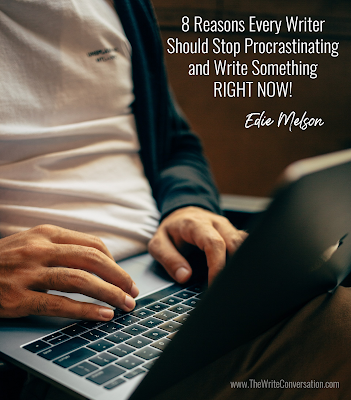
by Edie Melson @EdieMelson
We writers tend to be an odd lot. We obsess about learning to write better. We hang out with writers online and in person. We buy books on How to Write, How to Write Better and How to Sell What We Write.
But we do almost anything we can to avoid the actual act of writing. Nothing shuts down a writer quicker than a blank page and/or a blinking cursor.
We comfort our guilt-ridden internal writer with the promise of writing when:That closet is clean.The kitchen is organized.The laundry is done.Facebook is checked one last time.Dinner is cooked.Groceries are bought.
You get the idea.
Truthfully, the longer we postpone sitting down and writing, the harder it gets. Avoidance gives volume to those nasty little voices that live in a writer’s head. Voices that say:You’re not good enough.No one will ever read this.You’ll never get published.No one will ever take you seriously.You’ll never sell anything.
You know. You’ve heard those voices.
8 Reasons to Write Something RIGHT Now
1. You’re not getting any younger. I know, it’s a cruel truth to begin with. But it doesn’t matter how young (or old) you are, time marches on.
2. It won’t get any easier to start, but it WILL get easier once you begin. The hurdle is the starting. And it’s a hurdle that has to be surmounted every single day of your writing life. Beginning rarely gets any easier.
3. If you don’t start, you’re already a failure and the voices have won. I hear a lot of writers say that if they don’t start (or don’t submit) they won’t fail. That’s a lie. If you won’t start, you’ve already failed.
4. As a writer, NOT writing will hurt you. I’ve seen writers deal with depression, anxiety and other issues that immediately disappeared when they sat down and began to write.
5. Practice makes perfect. There’s only so much improvement you can make by learning about writing. It’s time to put what you know into practice.
6. Only writing makes you a writer. Talking/Learning about it doesn’t isn't good enough.
7. What you have to share through the written word matters. Yes, this applies to everyone. We all have things to contribute to the lives of others. The way a writer does this is through the written word. So get on with it, someone needs to read what you have to say.
8. If you don’t, you’ll always regret it. I’ve never met a writer who regretted writing, but I’ve met plenty who regretted NOT writing.
It doesn’t matter if I’m working on a book, a blog post, or something else. I have to remind myself about these things almost every time I sit down to write. We all fight the idea that we don’t have a contribution to make that’s worth the effort.
What about you? Please add to the list of reasons to write, RIGHT now. We’re all stronger together.
Don’t forget to join the conversation!Blessings,Edie
TWEETABLE8 Reasons Every Writer Should Stop Procrastinating and Write Something RIGHT NOW! from author @EdieMelson (Click to Tweet)
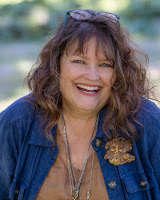 Edie Melson is a woman of faith with ink-stained fingers observing life through the lens of her camera. No matter whether she’s talking to writers, entrepreneurs, or readers, her first advice is always “Find your voice, live your story.” As an author, blogger, and speaker she’s encouraged and challenged audiences across the country and around the world. Her numerous books reflect her passion to help others develop the strength of their God-given gifts and apply them to their lives. Connect with her on her website, through Facebook, Twitter and Instagram.
Edie Melson is a woman of faith with ink-stained fingers observing life through the lens of her camera. No matter whether she’s talking to writers, entrepreneurs, or readers, her first advice is always “Find your voice, live your story.” As an author, blogger, and speaker she’s encouraged and challenged audiences across the country and around the world. Her numerous books reflect her passion to help others develop the strength of their God-given gifts and apply them to their lives. Connect with her on her website, through Facebook, Twitter and Instagram.Featured Image: Photo by charlesdeluvio on Unsplash
February 19, 2023
Marketing with Palancas to Leverage Your Books and Brand

by Karen Whiting @KarenHWhiting
Palanca is a Spanish word that means lever. In science levers are used to more easily move or lift a load. At retreats, they are used as surprise gifts to represent the spiritual force of the Hold Spirit in our lives. They remind us that prayer can lift us up and use our abilities to do more than we thought possible. These can be letters or little gifts, activity kits, or trinkets. Just something affordable that shows you care about the reader and serves as a connection to your brand.
One friend called them swag gifts. These include bookmarks, pens, postcards, and even more expensive items like mugs, t-shirts, and bags. They can also be hand made or something unusual you discover. I recall an author who had a novel where the story took place in Austria hands out tiny, dried Edelweiss. I kept it for years as I always wanted to travel there (and finally did a one day stop enroute to speaking in Russia).
Finding the Right Palanca
It often starts with an image or phrase that you can promote. When the book is focused on growth, a packet of seeds can be great with a printed label added to it to connect your book to the concept of new growth. They could be veggies or flowers, depending on the image you want to use or an anecdote in the book.
Start with recurring images in your book or a humorous anecdote. I wrote a book on time management years ago that’s now an eBook. The story I told when I spoke involved pinecones and they became a memento to use with the book, especially tiny ones I could easily carry with me. Once you think of an image, consider adding it to a bookmark or finding a small trinket online that is sold in quantity.
Or approach it by finding an item you like, even a crayon, and considering how it matches your theme, such as adding color to your life. One friend has a children’s book with snail characters. Think how fun it would be to pass out tiny snail shells with the book. A permanent marker could be used to add one of the character’s names.
Making Activity Kits
For children’s books, the illustrations often provide the ideas. And illustration outlines can become coloring pages or be made into a tiny book to color. Women also enjoy coloring, so having the cover or other artwork as a coloring bookmark can be a perfect fit.
Another friend gave out mini-magnifying glasses to accompany her Bible study book with a bookmark on how to look deeper in examining God’s word. That connected them to her book, but also gave them tools to use. Another study leader wrote a book on direction and gave out little compasses with notes on finding God’s direction.
There are endless possibilities when you start to think about the goal of your book like getting readers to go deep.
Use Palanca to Equip Leaders
My line of books includes craft books and books with activities, so I often make an activity kit when I’ll be promoting the books. One devotional book for boys includes Bible stories with snakes. So, I am making little paper snake puppets with a link to the pattern to give children’s ministry leaders at an upcoming show. They can have immediate fun playing with them, use them to introduce the book or related lesson, and download the pattern to make them with the kids. I’ll also add in a one-page handout that becomes a new, original hidden window story to connect with my paper craft book plus the link to make more copies. This equips the leaders with inexpensive ideas to use.
This type of gift that equips can be a bookmark with steps to take, a refrigerator tile with a call to action. Remember the wood circles called round tuits to get around to doing something? That’s a great example.
Make the Most of Palancas for Greater Connections
Palancas, like the activity kits and bookmarks, can have a link to provide more. A book on peace could include giving people a tiny dove with a link to a website on steps toward inner peace. Then you can put up a landing page as a link where you include subscribing to your newsletter for more information. Or give a link to a quiz that segments your audience to direct them to what they need most. That kind of quiz is great when you have a group of books where each one might be targeted to a specific need within your brand, or a book that addresses segments such as personalities.
Brainstorm Ideas
Gather a few friends to brainstorm ideas for your next book, or your brand. It can be a fun time as you help one another. If you feel stumped, it might be time to hire a coach for one time just to focus on palancas and other marketing ideas. Suggest that everyone arrive with a few of their calls to action, images they relate to in their book, the most humorous story in the book, and the goal for their readers. Those should inspire ideas.
Hopefully what you choose to give, will lift the reader’s spirits, and help them remember your book and brand!
TWEETABLEMarketing with Palancas to Leverage Your Books and Brand, tips from @KarenHWhiting on @EdieMelson (Click to Tweet)
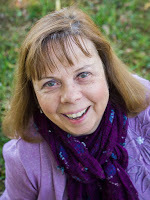 Karen Whiting (WWW.KARENWHITING.COM) is an international speaker, former television host of Puppets on Parade, certified writing and marketing coach, and award-winning author of twenty-seven books for women, children, and families. Her newest book, The Gift of Bread: Recipes for the Heart and the Table reflects her passion for bread and growing up helping at her grandparent’s restaurant. Check out her newest book Growing a Mother’s Heart: Devotions of Faith, Hope, and Love from Mothers Past, Present, and Future. It's full of heartwarming and teary-eyed stories of moms.
Karen Whiting (WWW.KARENWHITING.COM) is an international speaker, former television host of Puppets on Parade, certified writing and marketing coach, and award-winning author of twenty-seven books for women, children, and families. Her newest book, The Gift of Bread: Recipes for the Heart and the Table reflects her passion for bread and growing up helping at her grandparent’s restaurant. Check out her newest book Growing a Mother’s Heart: Devotions of Faith, Hope, and Love from Mothers Past, Present, and Future. It's full of heartwarming and teary-eyed stories of moms.Karen has a heart to grow tomorrow’s wholesome families today. She has written more than eight hundred articles for more than sixty publications and loves to let creativity splash over the pages of what she writes. She writes for Crosswalk. Connect with Karen on Twitter @KarenHWhiting Pinterest KarenWhiting FB KarenHWhiting.
Featured Image: Photo by Patrick Perkins on Unsplash
February 18, 2023
How to Find Encouragement When a Writer Struggles to for Confirmation

by Tammy Karasek @TickledPinkTam
A dreaded question a new writer receives when meeting someone is What to you do? The questions that follow often come in rapid succession. “Oh, what do you write? What’s the title of your book? Where can I find it?” And the various comments. "I want to write a book someday when I have time.” Or, “it must be great to sit in coffee shops all day and write lots of books.”
As a writer without a published book yet, it can be a little stressful since invariably the answers given may garner a facial expression that is awkward. A look much like a cross between pity and so you’re not trying. For many years, I’d offer some pittance of stammering not willing to answer that question with the phrase I am a writer.
Ugh.
I struggled to say the truth to them. I know they meant well, but I knew I’d feel self-inflicted embarrassment once I’d said out loud … “I write on my blog, I guest post, I’m writing and editing a fiction serious. I’m not published yet.”
I’ve received the puppy dog eyes, the slight downturn of their lips and the dropping of the chin as they’ve softly said, “Oh, I thought you were a writer.”
Non-writing people have no idea the hours we writers put into getting the words down on paper, then edit and edit to get them to their best prose. To anyone who doesn’t write for a living they think it’s no big deal. Sit down and write. Done.
I love Earnest Hemingway’s quote that I think every one of us who do write have committed to memory: “There is nothing to writing. All you do is sit down at a typewriter and bleed.” I might add to that “…and bleed, cry and stick my tongue out at that taunting cursor.”
Any nodding of heads out there?
I want to encourage you today. I’d like you to join me in the exercise below, please know that I’m work to practice what I preach. I do this exercise often. I need to. I’ll be honest and say that I’m not always a good listener of my own lesson, but the more I do this simple exercise, the easier it has become. Less stressful, too.
Whenever you look in the mirror or your reflection in a window, I want you to say these phrases out loud. Nope, don’t care if there is anyone else around—that’s even better. They need to hear it, too. Ready? Here’s the first one …
You are a writer!
That was easy, right? It’s so much easier lifting up someone else in encouragement. Let’s make it more personal in this next part, take a good deep breath and say out loud …
I am a writer.
What? Can’t hear you, once again only louder …
I AM A WRITER!
Great job. Honestly, this has been a tough one for me after the odd questions and comments I’ve received. But, it’s okay. I keep telling myself, it’s part of the training, girl. Chin up. You can do this.
As I sit down to my computer or my notebook to write, I’m trying a new thing. Maybe this will help you as it’s helping me. As I begin, I say, “I am a writer and now I will write.” Sometimes I have to repeat it a couple of times because the old devil wants to start an argument right then and there, but I don’t want that. It may seem silly, but if it works, it’s worth it. With repetition, we gain a new habit. Chin up, you’re walking in the God-given calling of a writer. Own it.
Answer this question, friends … “Nice to meet you. What do you do?”
Ah, I heard you say it and I believe you. You are a writer. Imagine that—I am a writer, too.
In the comments below, share if you’ve had to overcome the issue of feeling awkward saying you’re a writer without a published book—yet. What tips have you used to be bold and say I am a writer?
TWEETABLEHow to Find Encouragement When a Writer Struggles to for Confirmation from @TickledPinkTam on @EdieMelson (Click to Tweet)
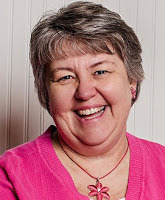 Tammy Karasek uses humor and wit to bring joy and hope to every aspect in life. Her past, filled with bullying and criticism from family, drives her passion to encourage and inspire others and give them The Reason to smile. She’s gone from down and defeated to living a “Tickled Pink” life as she believes there’s always a giggle wanting to come out!
Tammy Karasek uses humor and wit to bring joy and hope to every aspect in life. Her past, filled with bullying and criticism from family, drives her passion to encourage and inspire others and give them The Reason to smile. She’s gone from down and defeated to living a “Tickled Pink” life as she believes there’s always a giggle wanting to come out! When not writing Rom-Com, she’s The Launch Team Geek helping authors launch their books and also a Virtual Assistant for a couple best-selling authors. Her work was published in a Divine Moments Compilation Book—Cool-inary Moments. She’s also the Social Media Manager for the Blue Ridge Mountains Christian Writers Conference, Founding President and current Vice-President of ACFW Upstate SC, and Founding President of Word Weavers Upstate SC. She’s a writing team member for The Write Conversation Blog, Novel Academy, MBT Monday Devotions, The Write Editing and others. Connect with Tammy at HTTPS://WWW.TAMMYKARASEK.COM.
Featured Image: Photo by Eliott Reyna on Unsplash



